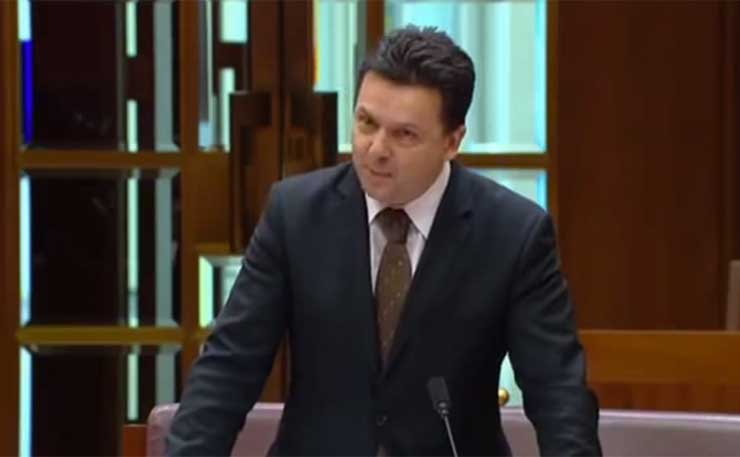The Senate has voted to ‘reform’ Australia’s media laws. It’s not really a reform, writes Ben Eltham.
Communications Minister Mitch Fifield’s aims for ‘media reform’, which he ushered through the Senate last week, were modest.
The bill, which took months to negotiate through a difficult Senate, is entitled the Broadcasting Legislation Amendment (Broadcasting Reform) Bill 2017.
But there isn’t really a whole lot of reform. The new law will remove several of the remaining regulations on media ownership in Australia. But it won’t save the mainstream media, even it does let a few more legacy media companies merge.
The bill removes outdated 1980s rules about the ‘reach’ of a single broadcaster – irrelevant in the internet age. It also removes cross-media ownership rules that also seem antiquated in a time of machine learning IT and locked and integrated phone-app-social media environments. In theory, this frees up some of the existing players to merge: Seven and Fairfax say, or News Corp and Nine.
But the bill does nothing to address the basic and insoluble problem that is destroying the Australian commercial media: the disappearance of advertising, their primary source of income.
The bill won’t achieve any of the aims advanced for it by Communications Minister, such as propping up the sustainability of big media companies. It can’t do that, because ownership is not the main problem facing the Australian media.
As anyone with an internet connection can understand, the contemporary media environment is utterly dominated by a handful of giant US tech firms. An industry estimate from 2016 put Facebook and Google’s combined share of global advertising revenue at 70 per cent.
The main problem faced by for-profit media companies in Australia like Fairfax and News Corp is the destruction of their old business model by the US tech giants Google and Facebook. The existential threat posed by the tech giants is the migration of advertising revenue online, where it is being almost completely duopolised by the two tech platforms. The bill passed last week does nothing to stop that process. In fact, it has nothing to say about the tech giants at all.

In such an environment, the merger of a few senescent firms will have little impact on the viability of the Australian commercial media. The industry has little chance of seizing back the advertising that has departed, and must completely rebuild itself on different revenue models. Direct subscriptions seem unlikely to fill the void.
Mitch Fifield is right about one thing: there is no doubt that the Australian news media is struggling. The once-powerful Australian television networks and newspaper publishers are ailing. They are shrinking, shedding billions in shareholder value and thousands of full-time jobs for journalists.
Conservative estimates put the figure of journalism jobs lost in the last five years at around 3,000. There are still plenty of journalists covering federal politics in Canberra, but far fewer covering the state parliaments, and hardly any covering local governments any more. Specialist policy rounds have been especially hard hit. There are far fewer Australians working overseas as foreign correspondents.
The malaise is widespread. It is increasingly difficult to find intelligent and informed coverage of crucial policy areas like health, energy, broadband, welfare or industrial relations. More marginal fields, like arts journalism, have nearly disappeared.
It is true that specialist and independent media outlets are in some cases offering excellent coverage of various fields: Croakey in health, for instance, or Renew Economy in energy. In recent years, Crikey, The Saturday Paper and yes, New Matilda have all conducted serious investigations and broken important news. These are just the sort of smaller publishers that might reasonably be expected to benefit from the federal funding negotiated by Nick Xenophon.
But in other areas, the independent media is less able to step up. Court reporting, for instance, has long been a staple of daily metro newspapers. Doing it properly requires specialist skills and legal knowledge. The problem was dramatically highlighted by the contempt of court charges laid against Krystal Johnson, a Yahoo7 reporter whose botched reporting of a criminal case led to a Victorian murder trial being aborted. Yahoo7 was later fined $300,000 and Johnson was given a two-year good behaviour bond.
As journalism academic Margaret Simons notes, in a recent piece for the Guardian:
The crisis is in the hollowing-out of the traditional, non-glamorous, non-award-winning yet essential reporting of state parliaments, courts, local governments and other local public events and issues.
None of the new players report state affairs in detail, do a solid job of court reporting, or touch local government except when there is a national issue at stake (such as citizenship ceremonies and Australia Day). Meanwhile legacy media has withdrawn from the local.
None of these trends are new, and none of them are reversing. The hurricane of creative destruction that has swept through the media industries in recent years shows no sign of abating.
For a glimpse of just how weird the future of news could get, you only need to consult a recent article by the BBC’s Trushar Barot for the Nieman journalism laboratory. Barot describes a near future in which computer AI has reached such sophistication that it will completely upend tech and media – again. “The future of news is humans talking to machines,” Barot predicts. “All indications are that voice is going to become one of the primary interfaces for this technology, complementing screens through providing a greater ‘frictionless’ experience in cars, smart appliances and in places around the home.”
Children in particular seem to find AI characters like Siri extremely engaging.
What that might mean for the news industry is anyone’s guess: perhaps it could herald a new future for broadcasting. But it is just as likely that it will become a new platform, monopolised by a single firm and owned by a single billionaire. The pace of change in media is so rapid that it is not surprising that many media companies are struggling.
Given this, can we expect legislators to keep up? Such problem-solving skill seems unlikely from this government, which can’t even get its head around renewable energy.

Unfortunately, the $60 million package that Nick Xenophon has negotiated as the price of his party’s support is window-dressing, at best. As New Matilda’s Chris Graham points out, small dollops of politically fraught funding will have minimal impact on the sustainability of the sector – even for the handful of small publishers likely to qualify.
There is a sound justification for a robust and well-designed public fund to support public-interest journalism. The Xenophon scheme negotiated with the government is not it. It won’t be available to news outlets that deserve it, such as the Guardian, and it won’t fund journalism directly, but rather will only support cadetships or small-scale capital infrastructure.
Where government funds are made available to publishers and news operations, the best model would be an arms-length peer review process along the lines of the Australian Research Council or the Australia Council for the Arts. Funds would be best distributed for specific projects with specific outcomes, at the level of the individual journalist or investigation team.
As a result, the decline of journalism in Australia will almost certainly continue.
This is a problem, because the way that citizens find out about the world is a vital link in the civic chain of democracy. If voters are increasingly fed fake news in a algorithmically constrained social media bubble, the democratic outcomes could be dangerous indeed.
Serious questions are finally being asked about the dominance of the big tech companies in Australian media, and whether that is a good thing for our democracy. Google and Facebook are for-profit entities based in the United States. Neither firm is regulated in any robust fashion under Australian law. Both are still controlled by their plutocratic founders. The power this cedes to individuals – like Facebook’s Mark Zuckerberg – is difficult to overstate.
At some point, and soon, Australians should ask themselves whether the commanding heights of the Australian digital economy should be left in the hands of foreign billionaires.
Perhaps the ongoing Senate inquiry into the future of journalism will yield some bold new policy proposals. But considering the history of Australian media regulation, you wouldn’t put too much faith in the ability of legislators to curb the interests of the powerful.
Donate To New Matilda
New Matilda is a small, independent media outlet. We survive through reader contributions, and never losing a lawsuit. If you got something from this article, giving something back helps us to continue speaking truth to power. Every little bit counts.






